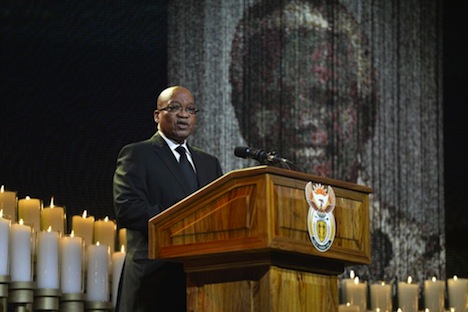3. South Africa general election, expected in April.![]()
Everyone expects Jacob Zuma’s African National Congress (ANC) to win the spring general elections that are likely to be held in April or May (but in any event before July), and after winning reelection to the presidency of the ANC in December 2012, no one doubts that Zuma will continue as South Africa’s president for years to come.
But that doesn’t mean Zuma — or even the ANC — are widely popular, as evidenced by the jeers that met Zuma (pictured above) when he appeared at the memorial service for the late South African president Nelson Mandela in December 2013. Zuma, who has faced criminal charges in the past ranging from rape to political corruption, came to power as South Africa’s third post-apartheid president in the April 2009 elections, when the ANC won 263 of the 400 seats in the National Assembly, the lower house of South Africa’s parliament.
With Mandela’s death, it may become even harder for the ANC to maintain its unity, which means that the 2014 vote could be the last in which the ANC’s victory is virtually guaranteed. A major splintering of the ANC could result in the advent of a new two-party era in South African politics, especially with Zuma hoping to establish as his successor businessman Cyril Ramaphosa, who comes from the same aging generation as Zuma and former president Thabo Mbeki.
In 2014, watch for former journalist, anti-apartheid activist and former Cape Town mayor Helen Zille to lead the main opposition party, the Democratic Alliance (DA), to its best-ever result, though it’s still plagued with the image as the party of white elitists from wealthy Western Cape province. Also keep an eye on Mamphela Ramphele, the widow of murdered anti-apartheid activist Steve Biko, who has formed a new party, AgangSA.
Former ANC Youth League leader Julius Malema, who was exiled from the ANC after his conviction for hate speech, is running under the banner of a new ‘protest movement,’ the Economic Freedom Front (EFF), which espouses the kind of radical, redistributive positions that the ANC embraced in the 1960s and 1970s. Malema, in particular, could give voice to a new generation of impoverished black South Africans for whom economic gains have failed to materialize under the ANC’s nearly two-decade rule.
Photo credit to AFP / Odd Andersen.

One thought on “14 in 2014: South Africa general election”